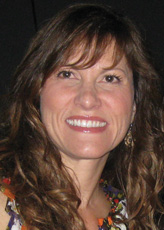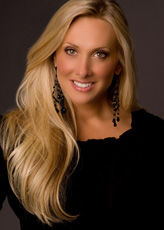Local experts dish out their best relationship advice
Permanent link All PostsThe rabbi, the therapist, and the matchmaker. No, this isn't the start of a bad joke. In honor of Valentine’s Day, we asked some local experts for their take on tough relationship conundrums that are on the minds of Jewish Chicagoans—married and single.
The rabbi

Rabbi Abe Friedman is a rabbi at Anshe Emet Synagogue in Chicago.
The therapist

Lili Gray, LCSW, is the director of Adult, Family and Child Services at Jewish Child & Family Services' Arlington Heights Office.
The matchmaker

Barbie Adler, based in Chicago, is the founder and president of the leading matchmaking firm Selective Search.
Q. What do you recommend to single frustrated Jews looking for their match who have tried the Jewish social scene and Jewish dating sites—and still haven't found the one?
The rabbi: Forget about looking for your "match," and find other Jewish singles who are interested in things that you like doing. Sometimes the pressure created by "singles" events can be counterproductive; instead, look for other activities where you are likely to meet Jewish singles but where the focus is on something else—synagogue, classes, arts and culture, sports. Connect with new friends around shared interests, and see what other relationships might emerge from there.
The therapist: Instead of focusing on the dating scene, focus on yourself, and tending your own garden first. Take classes or attend programs related to your own hobbies and interests, where you will naturally be meeting people who have common interests—including someone who may be your match or know the perfect match for you. Focus on the inside, rather than the outside. At a bare minimum you will be more interesting and happier—and that is attractive to others.
The matchmaker: Don't give up. Your Jewish life partner is out there. Take it upon yourself to create a love life game plan. Determine what's working and what's not working. What can you do different or what can you do better? Are you hanging out in the same places huddled with the same people expecting to meet new people? Mobilize your friends to invite like-minded Jewish singles and host a joint dinner party. Also—very important—if you have high standards in your future mate, be your best in return. That means emotionally and physically be the best version of you. If you are still mending your heart over your ex or you haven't taken care of your body in a while—take the time to first be happy with yourself and then put yourself online and not before... Keep the faith. Your one and only is out there—don't be discouraged because your friends have coupled up sooner than you have. Your time will come—be happy, invest in yourself, and all else will follow.
Q. And for people recently back in the dating scene after years in a relationship, where do they begin?
The rabbi: Date yourself. If there's something you would do, if only you had a date—see a movie, try a new restaurant, go to a concert—do it anyway. At the very least, you'll get out and have a good time; but more than that, you'll be getting back in touch with the things you love most—the same things that will hopefully attract your next partner.
The therapist: You are just out of relationship, one that just ended for whatever reason. This is a good time first to spend reflecting—what happened in last relationship? (Remember to look at what you BOTH did, not just your partner.) Assess who you are right now and what you have to offer a partner. And, if you waved a magic wand, who is your perfect match? Now look if there is a gap between what you want, and what you offer, and if so, what might you change in you? Looking at ourselves is the thing we have control over, where we can make ourselves the best potential partner we can be. And don't forget to wonder if there was anything you could have done differently, that you can learn from in future relationships.
The matchmaker: Embrace the fact that this will be an incredible new exciting chapter in your life. You just went through a heavy rainstorm and it's now time for the sun to shine in your personal life again. Even the most amicable divorce is still a major stressor to overcome. Make sure you take the time to heal. Then rediscover yourself and things that make you happy. Take a temperature read of the person you are today and write down what you know you need in your encore love. You aren't the same person when you got married—so your criteria of who he/she is may be different. Once you feel you are at your best—it's time to date! [In addition to using dating sites,] get out there and meet new people. Let your interests and passions guide you. Don't wait to be invited to a party—host the party! Very important tip: Both men and women will lace up their shoes and run for the hills if they detect that you are a hater of the opposite sex. When you meet someone that has potential, show them just how amazing you are. Be quick to smile, laugh and show your passion for life, friends, and family.
Q. How do you help a friend who's in a bad relationship?
The rabbi: One of my wife's friends was once engaged to a man that her friends could not stand. When my wife asked me what she could do to stop her friend from marrying this guy, I told her she should express her concerns once, and then let it drop—her friend was going to do what she was going to do, and the best thing the other friends could do was to protect the friendship so that if things did go sour, she would still have her friends for support. A few years later, when the friend's marriage fell apart—in the worst possible ways—the same friends who were against the marriage in the first place helped her rebuild her life. And no one said, "I told you so."
The therapist: Giving advice is problematic, if a friend is not asking for it. He or she may complain, but not actually ask for help. The best thing to do is to listen and be there when they want to talk. If someone is asking for advice—you need to be careful. If you speak negatively of a partner, and they stay together, your friendship might suffer. Perhaps the best response is "My opinion is that I care about you, I can see you are hurting, and I want to be supportive in whatever you decide to do."
The matchmaker: Adhere to the golden rule—be the friend to others that you want someone to be to you. Come from a place of love and compassion and be honest with your friend. Let your friend know if they are truly happy, you are happy but you keep witnessing or hearing unhealthy patterns in their relationship and you wouldn't be a friend if you didn't express your concern. Be careful not to judge or overstep your boundaries. Everyone has to make their own choices—if you don't like the person but your friend does, all you can do is be there for your friend but careful as your friend may not be ready to hear it and it could backfire and place a fracture on your relationship with your friend.
Q. How do newlyweds meld their own Jewish traditions with those of their spouse's family?
The rabbi: My mother likes to tell the story of the first Shabbat dinner she made after she and my father got married. Everything was set just right, and she brought the chicken from the oven, set it on the table, and sat down. Then the two of them stared at each other over the chicken for ten minutes until they figured out that my mother's father always cut the chicken in their house, while in my father's house his mother did it—so each of them were waiting for the other to serve the food. The moral of the story: you don't know what you don't know, but clear communication—and a good sense of humor!—will go a long way.
The therapist: Hopefully the newlyweds talked about this before they got married! The Chuppah Project is program JCFS offers where couples can come together, so they've talked through the important stuff before marriage. There are lots of stresses and unspoken expectations in marriage, which is why it's better to talk about it before the big date. With the Chuppah Project, you will: 1. Clarify expectations of marriage; 2. Learn healthy communication; 3. Address differing family and religious traditions; and 4. Think about the Jewish aspect of your marriage. And if you didn't talk in advance? Just call and you can go to therapy. Couples therapy doesn't always mean a big problem. It can be around these kinds of day to day issues that are pretty normal to be struggling with in a new marriage.
The matchmaker: It's important to talk about what traditions mean the most to each of you. Then, the secret sauce is compromise. Give thought to what you and your spouse love about your Jewish traditions and talk through how you can celebrate and honor both of your sacred traditions as well as make a new tradition of your own. For success with melding family traditions like whose family will we be with for Passover, etc. take out the Jewish calendar at the beginning of the year and map out what holiday is more important to your family vs. your spouse's family and try to incorporate the calendar to make everybody happy. Manage your expectations and let both families know you are trying the best you can.
~Compiled by Cindy Sher with Cheryl Jacobs and Stefanie Pervos Bregman.



.jpg)



